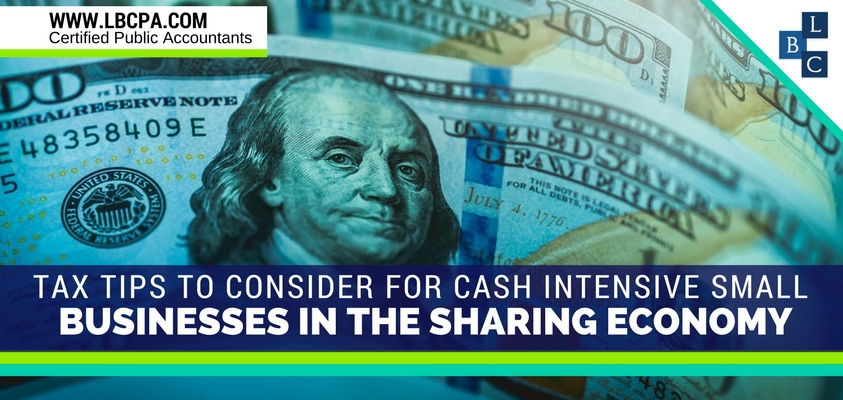LBCPA News 
Click here to go back
Tax Tips to Consider for Cash Intensive Small Businesses in the Sharing Economy

Small business owners that offer goods and services through an online platform may be part of the sharing economy. Some participate part time while others operate full time. Activities such as ride sharing, freelancing, renting a spare bedroom and crowd funding are usually taxable. The IRS has a Sharing Economy Tax Center to help these taxpayers find the information and help they need to meet their tax obligations.
Some sharing economy tips for small businesses to consider:
Taxes. Sharing economy activity is generally taxable. Payments received in the form of money, goods, property or services may require filing a tax return to report that income to the IRS.Tips. People often conduct sharing-economy activities electronically but tips in cash are still a common occurrence. Tips are generally subject to withholding. Small businesses or self-employed persons should report tips they receive as income on Schedule C or C-EZ. See Publication 334, Tax Guide for Small Business, for more details.
Large Cash Amounts. Any person in a trade or business who receives more than $10,000 in cash in a single transaction or in related transactions must file Form 8300, Report of Cash Payments Over $10,000 Received in a Trade or Business, within 15 days after receiving payment.
Deductions. Expenses to carry on a trade or business are usually deductible. Examples include claiming the 54 cents per mile rate for 2016 when using a car for a ride-sharing business. Or deducting the commission/fee charged by a freelancer marketplace service.
Estimated Payments. Small businesses in the sharing economy often need to make quarterly estimated tax payments to cover their tax obligation. Form 1040-ES, Estimated Tax for Individuals, will help to figure these payments. IRS Direct Pay is the fastest and easiest way to make these payments. The Treasury Department’s (EFTPS) system is also an option.
Records. Good records assist in monitoring a business’s progress, tracking deductible expenses and can substantiate items reported on tax returns. A good recordkeeping system includes a summary of all business transactions. Generally, it is best to record transactions on a daily basis.
If you have any questions regarding accounting, domestic taxation, international taxation, IRS representation, U.S. tax implications of Real Estate transactions or financial statements, please give us a call at 305-274-5811.
Source: IRS






